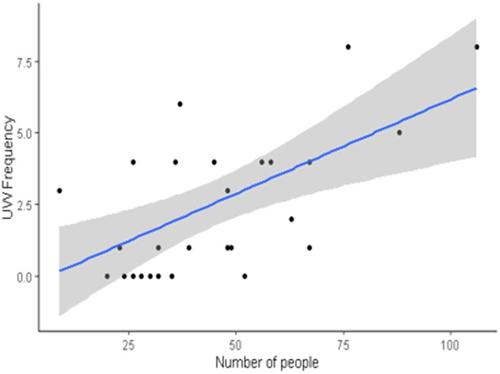当前位置:
X-MOL 学术
›
Am. J. Primatol.
›
论文详情
Our official English website, www.x-mol.net, welcomes your
feedback! (Note: you will need to create a separate account there.)
Urine washing in urban robust capuchin monkeys (Sapajus sp.): The relation with visitors
American Journal of Primatology ( IF 2.0 ) Pub Date : 2022-04-07 , DOI: 10.1002/ajp.23381 Patricio D Reyes 1 , María Celia Baldovino 2, 3 , Lucas M Aguiar 4, 5
American Journal of Primatology ( IF 2.0 ) Pub Date : 2022-04-07 , DOI: 10.1002/ajp.23381 Patricio D Reyes 1 , María Celia Baldovino 2, 3 , Lucas M Aguiar 4, 5
Affiliation

|
In primates, urine washing (UW) is a behavior in which individuals intentionally deposit urine on their bodies. Social and nonsocial hypotheses have been proposed to explain the adaptive function of this behavior. For capuchins, different functions have been assigned for UW, suggesting it as a flexible behavior, but studies have been mainly in captivity. However, no investigations have been performed in urban environments, where these animals can modify their behavior. Our goal was to study UW in a semi-provisioned group of an introduced unknown robust capuchin species (Sapajus sp.) living in a tiny urban fragment in Foz do Iguaçu, Brazil, where they have contact with humans. We assessed the influence of social (sexual, agonistic, and anointing behaviors) and environmental (temperature, relative air humidity, height of the monkeys in the trees, number of people present in the fragment, and human-monkey interactions) variables, the influence of behavior before and after UW, and the influence of sex-age classes, on the frequency of UW. We observed 75 records of UW in 300 h of observations, where urine was mostly deposited on hands and passed on to feet (95%). There were no significant differences in the frequency of the behavior between sex-age classes nor in the behaviors before and after UW. Around 50% of UW took place in the late morning and we found no correlation between UW and temperature, relative air humidity, nor the heights of the monkeys in the trees. However, we found a significant association between UW and the daily number of people in the fragment, but not between UW and human-monkey interactions, anointing, agonisms, and sexual behavior. Our study increases the scope of UW flexibility by identifying the presence of visitors affecting the occurrence of this behavior. We discussed different possibilities through which people could influence the capuchins to display UW.
中文翻译:

城市健壮卷尾猴 (Sapajus sp.) 的尿液清洗:与游客的关系
在灵长类动物中,洗尿 (UW) 是一种个体故意将尿液沉积在身体上的行为。已经提出社会和非社会假设来解释这种行为的适应性功能。对于卷尾猴,已经为 UW 分配了不同的功能,这表明它是一种灵活的行为,但研究主要是在圈养中。然而,尚未在城市环境中进行任何调查,这些动物可以改变它们的行为。我们的目标是在引入的未知健壮卷尾猴物种(Sapajussp.) 生活在巴西伊瓜苏的一个小城市碎片中,在那里他们与人类接触。我们评估了社会(性、激动和涂油行为)和环境(温度、相对空气湿度、猴子在树上的高度、片段中存在的人数以及人猴互动)变量的影响, UW 之前和之后的行为以及性别年龄等级对 UW 频率的影响。我们在 300 小时的观察中观察到 75 条 UW 记录,其中尿液主要沉积在手上并传到脚上(95%)。性别年龄组之间的行为频率以及UW前后的行为没有显着差异。大约 50% 的 UW 发生在上午晚些时候,我们发现 UW 与温度、相对空气湿度、也不是树上猴子的高度。然而,我们发现 UW 与片段中的每日人数之间存在显着关联,但 UW 与人猴互动、恩膏、激动和性行为之间没有显着关联。我们的研究通过识别影响这种行为发生的访客的存在来增加 UW 灵活性的范围。我们讨论了人们可以影响卷尾猴展示 UW 的不同可能性。
更新日期:2022-04-07
中文翻译:

城市健壮卷尾猴 (Sapajus sp.) 的尿液清洗:与游客的关系
在灵长类动物中,洗尿 (UW) 是一种个体故意将尿液沉积在身体上的行为。已经提出社会和非社会假设来解释这种行为的适应性功能。对于卷尾猴,已经为 UW 分配了不同的功能,这表明它是一种灵活的行为,但研究主要是在圈养中。然而,尚未在城市环境中进行任何调查,这些动物可以改变它们的行为。我们的目标是在引入的未知健壮卷尾猴物种(Sapajussp.) 生活在巴西伊瓜苏的一个小城市碎片中,在那里他们与人类接触。我们评估了社会(性、激动和涂油行为)和环境(温度、相对空气湿度、猴子在树上的高度、片段中存在的人数以及人猴互动)变量的影响, UW 之前和之后的行为以及性别年龄等级对 UW 频率的影响。我们在 300 小时的观察中观察到 75 条 UW 记录,其中尿液主要沉积在手上并传到脚上(95%)。性别年龄组之间的行为频率以及UW前后的行为没有显着差异。大约 50% 的 UW 发生在上午晚些时候,我们发现 UW 与温度、相对空气湿度、也不是树上猴子的高度。然而,我们发现 UW 与片段中的每日人数之间存在显着关联,但 UW 与人猴互动、恩膏、激动和性行为之间没有显着关联。我们的研究通过识别影响这种行为发生的访客的存在来增加 UW 灵活性的范围。我们讨论了人们可以影响卷尾猴展示 UW 的不同可能性。











































 京公网安备 11010802027423号
京公网安备 11010802027423号